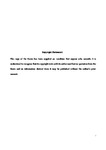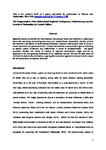The Construction of National Identity in post-1918 Poland
| dc.contributor.supervisor | Cordell, Karl | |
| dc.contributor.author | Lyszkiewicz, Bartosz | |
| dc.contributor.other | Faculty of Arts, Humanities and Business | en_US |
| dc.date.accessioned | 2015-06-16T11:46:25Z | |
| dc.date.available | 2015-06-16T11:46:25Z | |
| dc.date.issued | 2015 | |
| dc.identifier | 10089525 | en_US |
| dc.identifier.uri | http://hdl.handle.net/10026.1/3374 | |
| dc.description.abstract |
This thesis analyses the construction of the modern national identity in Poland following the state’s creation in 1918. Its central aim is to argue that although much of Poland’s national identity was, in fact, the product of the revolutionary eighteenth and nineteenth centuries, in the twentieth century, ethnocultural foundations proved essential in the process of nation building. In order to offer a novel approach to this issue this thesis will evaluate the programmes of the émigré organizations and political parties to demonstrate the role of the two national currents: ethnic/organic and civic/territorial, which developed during the nineteenth century and shaped competing definitions of Polish nation. Furthermore, this study will analyse the role of the pre-modern and early modern symbols in shaping the political currents in modern Poland. Locating and examining elements central to the definition of the nation will allow demonstration of how the distinctive national programmes were defined under successive administrations. This research argues that the rise of competing national identities in East-Central Europe, at the turn of the century, accelerated the dissolution of the common trait or national identity, shared by the elites across the Polish-Lithuanian Commonwealth. Deprived of legitimacy the authorities were unable to maintain the democratic system, gradually introducing authoritarianism, and by the late 1930s replacing the inclusive state model with the organic definition of the nation. This exclusive programme resurfaced following the Second World War and became a justification for the construction of an ethnically homogenous Poland. The Communist regime aimed to eradicate the pillars of national identity and to diminish the role of society in the state’s functioning; however, the nucleus of civil society which survived the period of persecution continued to grow in strength outside of the official channels. Effectively, this created a popular definition of the Polish nation in opposition to that of the regime. The competition between the ethnocultural and political definition of the nation remained a central issue over more than two decades following the collapse of the Communist regime. | en_US |
| dc.language.iso | en | en_US |
| dc.publisher | Plymouth University | en_US |
| dc.subject | Poland | en_US |
| dc.subject | Ethnicity | |
| dc.subject | Nation | |
| dc.subject | National identity | |
| dc.subject | Nation building | |
| dc.subject | Nation construction | |
| dc.subject | Politics of ethnicity | |
| dc.title | The Construction of National Identity in post-1918 Poland | en_US |
| dc.type | Thesis | |
| plymouth.version | Full version | en_US |
| dc.identifier.doi | http://dx.doi.org/10.24382/4251 |
Files in this item
This item appears in the following Collection(s)
-
01 Research Theses Main Collection
Research Theses Main



